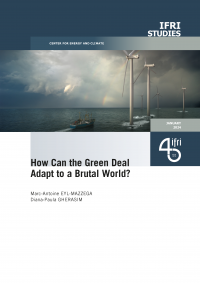
How Can the Green Deal Adapt to a Brutal World? Ifri Studies, Ifri, January 2024
The European Green Deal has not been planned for the current extraordinarily deteriorated internal and external environment. Russia’s war in Ukraine, higher interest rates, inflation, strained public finances, weakened value chains, and lack of crucial skills pose unprecedented challenges.

Additionally, insufficient global decarbonization efforts and a global economic and technological confrontation, notably via the weaponization of interdependencies and trade distortions are profound game changers that require a strategic rethink and readjustments.
The outlook is dire: while in the past, the European Union (EU) has been ultimately reinforced through crises, this pattern could now be disrupted as the EU could be increasingly overwhelmed by a succession and multiplication of overlapping crises, leading into unchartered territory. The EU will have overspent well over 600 billion euros (bn€) in energy imports that could have been allocated for the energy transition. The risk is that the EU continues to slip into a situation where it effectively decarbonizes, yet not due to modernization and effective policies but as its energy-intensive industries shut down further, in having growing import dependencies, non-functioning institutions, fragmented markets.
The European Commission (EC), the Parliament and Member States (MS) need to face several realities:
- Targets were raised, and there is progress in key areas such as solar photovoltaics (PV) deployment, heat pumps, and energy savings due to price signals, but meeting them is extremely difficult. Costs for mitigation investment (due to inflation and interest rates) and adaption are soaring. Investment is not following suit because value chains are weakened, projects are too risky or not profitable enough, and they require large subsidies. The strategic energy-intensive industries may well erode further. Governments have fewer financial resources when they need to spend massively and have no viable plan for effectively implementing an accelerated and just transition.
- Leading powers now jeopardize the EU’s competitiveness. China’s exports to Europe have been growing in a tsunami fashion, with the trade disbalance increasing from 200bn€ to nearly 400bn€ in two years. At the same time, policies by the United States of America are increasingly aiming at building resilience and economic security, with decarbonization and targets coming second. China’s lead in raw materials, batteries, solar PV, and digital systems may well be replicated in hydrogen, offshore wind, and nuclear. Transitioning without China is impossible. Transitioning while embracing China is potentially deadly if insufficient safeguards are put in place.
- The EU is at a fundamental economic disadvantage because it imports all its hydrocarbons, does not produce enough low-carbon technologies, and does not deploy them quickly and massively enough.
- Industries are facing high energy and carbon prices, stringent non-financial disclosure requirements, and Environmental, Social, and Governance (ESG) constraints. Many energy-intensive industries, banks, and energy companies are already shrinking, and leading automotive companies and low-carbon equipment suppliers are at risk. The EU will always be at a cost disadvantage compared to its main competitors and energy suppliers. It also faces a risk with industries in its mainland being at an energy disadvantage versus those at the peripheries and coasts. These risks could be overcome through a thriving economy and demography, renewed productivity gains, best-in-class infrastructure, reinforced education and skills, innovation, and a deeper internal market.
Current responses demonstrate an evolving understanding of the issues. Yet, there is a notable shallowness in recognizing their systemic nature, magnitude, and the potential existential threats they pose to the Union. EU’s decarbonization must go hand in hand with resilience and public acceptance. This study has identified ten key points that need to be addressed with priority to adjust the Green Deal to a brutal world, bearing in mind that much lies in the hands of governments who need to get their act together to implement what has been decided in the Fit for 55 package and beyond ...


